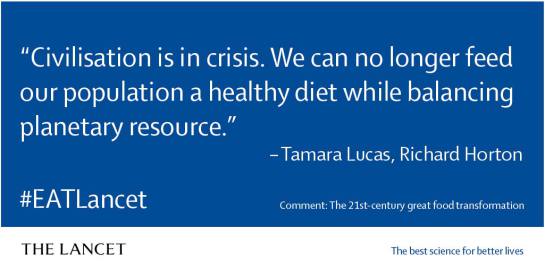Planetary Health Diet
To Achieve Planetary Health Diets for nearly 10 Billion People By 2050
More plant-based, less animal-based ingredients, that's what the Planetary Health Diet recommends: it offers guidance for sustainable and healthy eating.
EAT-Lancet Commission
Report: Healthy Diets From Sustainable Food Systems
Transformation to healthy diets by 2050 will require substantial dietary shifts. Global consumption
of fruits, vegetables, nuts and legumes will have to double, and consumption of foods such as red meat and sugar will have to be reduced by more than 50%. A diet rich in plant-based foods
and with fewer animal source foods confers both improved health and environmental benefits
Food-Planet-Health-EAT-Lancet_Commission[...]
PDF-Dokument [4.6 MB]
Transformation to healthy diets by 2050 will require substantial dietary shifts. Global consumption
of fruits, vegetables, nuts and legumes will have to double, and consumption of foods such as red meat and sugar will have to be reduced by more than 50%. A diet rich in plant-based foods
and with fewer animal source foods confers both improved health and environmental benefits
Food-Planet-Health-EAT-Lancet_Commission[...]
PDF-Dokument [4.6 MB]
A diet for our planets? Yes, for the health of our planet and for our own health. The Planetary Health Diet was created by the EAT-Lancet Commission, which
consists of scientists from all over the world. The goal is to provide a healthy, ecologically and socially sustainable diet for the entire world population. In other words, a kind of "manual" for
saving the climate. The basis is a predominantly plant-based diet with moderate consumption of meat and dairy products.
With a change in the meal plan, such as only 1 to 2 times meat per week, max. 1 time fish per week, many more legumes and nuts and vegetables, the Planetary
Health Diet also works well in everyday life.
The quantity recommendations of the scientists give orientation, even if they are only rough guidelines. They are based on a calorie intake of 2,500 kcal per day.
In some weeks, more of one ingredient will probably be eaten than in other weeks. Meat lovers in particular may prefer to eat a thick, juicy steak once a month rather than mini-portions every 3rd
day. Here it depends on the total amount - outliers are allowed.
Lana Weidgenant speaks at the "Youth priorities and commitments for a better food future" at the United Nations Food Systems Pre-Summit in Rome on the 26th of July
2021









